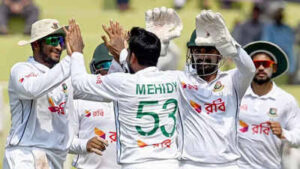
Just weeks ago, the streets of their national capital were flooded by one of the most volatile public protests seen in recent times in world history. It led to an uprising and an eventual overturning of a publically elected government. Bangladesh was the world headline for a few days because of the nature and character of that movement.
Far way, in Rawalpindi, a bunch of Bangladeshis scripted a similar unrest, as far as cricket is concerned. What is cricket? Just a game? Yes, and no. It can be merely a leisurely activity featuring the bat and ball. Yet, it can also go beyond the boundary and have bigger ramifications in its particular field. Bangladesh’s Test series win in Pakistan is one such incident.
There have been and will be upsets on the field of play. The history of sports is replete with many such stories. Bangladesh had inflicted a 2-0 Test series defeat on the West Indies in the Caribbean islands in 2009. They had also secured a creditable 1-1 draw in New Zealand in 2021-22. But the significance of their win in Pakistan goes beyond those feats.
The win in the West Indies came against a second-string side. The miracle of New Zealand happened due to the brilliance of one man called Ebadot Hossain. The revolution over two Tests in Rawalpindi was an outcome of total team effort. Not undermining the previous successes, this one stands tallest in Bangladesh’s cricket history because of the circumstances it was achieved in.
This is not because Bangladesh was a part of Pakistan from 1947 to 1971. That is history of a different kind. This one is historic in the cricketing parlance. They were up against a total of 448/6 declared and won that Test. Facing a total of 272 in the second, they were 26/6 and won that as well. Without a lot of cricketing steadfastness, these odds could not have been surmounted.
This took team work. Known as a side that relies mostly on spin bowlers, Bangladesh have unfurled some serious pace talent. Pacers Nahid Rana, Taskin Ahmed, the spin wing consisting of Mehidy Hasan Miraz and veteran Shakib Al Hasan — they ticked all the boxes as far as bowling was concerned. The variety is to be noted. Pace, carry, turn from the left-armer and right-armer, few teams can boast of this in contemporary cricket.
And when it came to batting, they showed gumption as well as application. To surpass a total of 448 in an away Test is no child’s play. Mushfiqur Rahim & Co did that in the first Test. It took hours of application and practical play to do that. To come back from 26/6 required a different kind of mettle and Litton Das & Co showed that too. Ironically for Pakistan, it was 26/6 at Eden Gardens in 1999, a position from where they had won that match against India.
A format of cricket losing relevance should also receive a shot in the arm because of this. Bangladesh winning the biggest Test series win in their history is a proverbial victory of the not-that-good class of cricket. They play, yes. Perform in patches, yes. But, in the end, they lose. This bunch of ‘Tigers’ has changed that narrative. It’s a big moment for Test cricket, which is as much threatened and under existential crisis as that regal animal.




